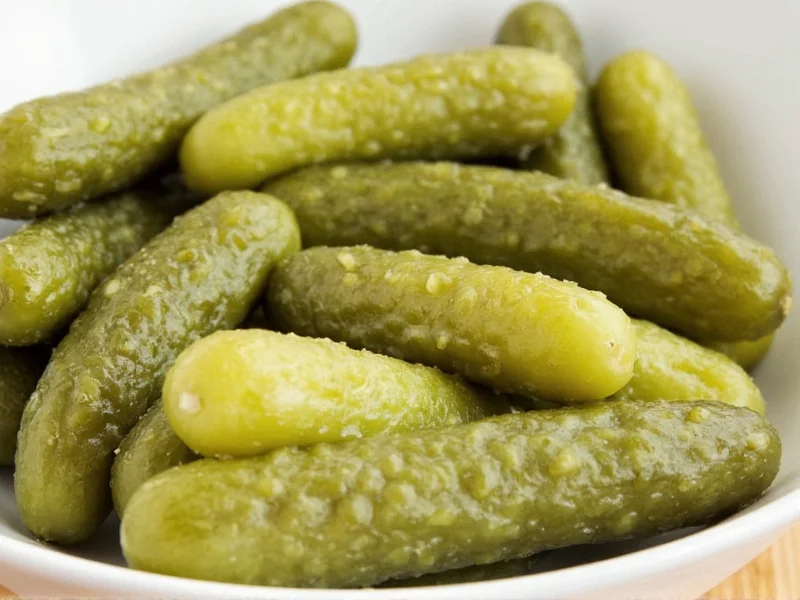No, most store-bought dill pickles do not contain probiotics because they're made with vinegar and pasteurization, which kills beneficial bacteria. Only traditionally fermented dill pickles that undergo lacto-fermentation without vinegar and remain unpasteurized contain live probiotics.
Understanding whether dill pickles contain probiotics requires examining how they're made. Probiotics are live beneficial bacteria that support gut health, but they only exist in foods that undergo natural fermentation without processes that destroy these microorganisms.
The Science Behind Probiotics in Pickles
True probiotic pickles develop through lacto-fermentation, a natural preservation method where lactic acid bacteria convert vegetable sugars into lactic acid. This process creates an environment where beneficial bacteria thrive while preventing harmful bacteria growth. During proper lacto-fermentation, Lactobacillus species multiply, creating the probiotic content that makes these pickles valuable for gut health.
Conversely, most commercial dill pickles use a vinegar-based brine. The acetic acid in vinegar preserves the cucumbers but doesn't allow beneficial bacteria to develop. Additionally, many store-bought pickles undergo pasteurization, a heat treatment that extends shelf life but destroys any potential probiotic bacteria.
Fermented vs. Vinegar-Based Dill Pickles: Key Differences
| Characteristic | Fermented Dill Pickles | Vinegar-Based Dill Pickles |
|---|---|---|
| Production Method | Lacto-fermentation with saltwater brine | Vinegar brine solution |
| Probiotic Content | Contains live probiotics | No probiotics (unless added back) |
| Shelf Location | Refrigerated section | Ambient temperature shelves |
| Processing | Unpasteurized | Often pasteurized |
| Label Indicators | "Raw," "unpasteurized," "naturally fermented," "contains live cultures" | No specific probiotic claims |
How to Identify Probiotic-Rich Dill Pickles
When shopping for probiotic dill pickles, check these critical indicators:
- Refrigeration requirement - Probiotic pickles must be kept cold to maintain live cultures
- Label claims - Look for "contains live cultures," "unpasteurized," or "naturally fermented"
- Ingredient list - Should contain only cucumbers, water, salt, dill, garlic, and possibly other spices (no vinegar)
- Absence of preservatives - Sodium benzoate or potassium sorbate will kill probiotics
Brands like Bubbies, Wildbrine, and some farmer's market offerings typically sell fermented probiotic pickles. These products will always be in the refrigerated section, never on room-temperature shelves.
Homemade Fermented Dill Pickles: A Probiotic Option
Making your own fermented dill pickles guarantees probiotic content. The process requires:
- Fresh cucumbers (preferably pickling variety)
- Non-iodized salt (like pickling or sea salt)
- Filtered water (chlorine-free)
- Fresh dill, garlic, and spices
- Proper fermentation vessel (glass jar or ceramic crock)
The cucumbers submerge in a saltwater brine for 1-4 weeks at room temperature. During this time, natural bacteria on the cucumbers convert sugars to lactic acid, creating probiotics. Once fermented, store in the refrigerator to slow fermentation while preserving probiotic content.
Health Considerations of Probiotic Pickles
While probiotic dill pickles offer gut health benefits, consider these factors:
- Probiotic diversity - Pickle fermentation typically produces fewer bacterial strains than yogurt or kefir
- Sodium content - Naturally high in sodium due to the fermentation process
- Acidity - The lactic acid environment may not survive stomach acid as effectively as some commercial probiotic supplements
- Quantity needed - You'd need to consume multiple servings daily for significant probiotic impact
For those seeking probiotic benefits, fermented dill pickles can complement other probiotic-rich foods like yogurt, kefir, sauerkraut, and kimchi as part of a diverse gut-healthy diet.
Common Misconceptions About Pickles and Probiotics
Several myths persist about probiotics in pickles:
- Vinegar doesn't create probiotics - Despite popular belief, vinegar preserves but doesn't generate beneficial bacteria
- "Dill" doesn't indicate fermentation - Dill refers to flavoring, not production method
- "Refrigerator pickles" aren't automatically probiotic - Many are simply vinegar pickles stored cold
- "Craft" or "gourmet" labels don't guarantee probiotics - Marketing terms don't indicate fermentation method
Understanding these distinctions helps consumers make informed choices when seeking probiotic benefits from pickled foods.
Do all fermented foods contain probiotics?
No, not all fermented foods contain live probiotics. Some fermented products undergo additional processing like baking, filtering, or pasteurization that kills the beneficial bacteria. For example, sourdough bread and most beers don't contain live probiotics despite being fermented.
How can I tell if my store-bought dill pickles contain probiotics?
Check if they're in the refrigerated section, look for labels saying "unpasteurized," "contains live cultures," or "naturally fermented," and verify the ingredients contain only cucumbers, water, salt, and spices (no vinegar). Products with vinegar or preservatives like sodium benzoate won't contain probiotics.
Are probiotic dill pickles as effective as probiotic supplements?
Probiotic dill pickles contain fewer bacterial strains and lower colony counts than most supplements. While they contribute to gut health as part of a diverse diet, they shouldn't be considered equivalent to medical-grade probiotic supplements for specific health conditions.
Do homemade vinegar-based dill pickles have probiotics?
No, vinegar-based pickles don't contain probiotics regardless of whether they're homemade or store-bought. The acetic acid in vinegar creates an environment that prevents the growth of beneficial bacteria needed for probiotics. Only salt-brine fermented pickles without vinegar develop probiotics.
How long do probiotics last in fermented dill pickles?
When properly refrigerated, probiotic dill pickles maintain live cultures for 4-6 months. The probiotic count gradually decreases over time as the fermentation process continues slowly in the refrigerator. Always check for signs of spoilage like mold, slimy texture, or off odors before consuming.











 浙公网安备
33010002000092号
浙公网安备
33010002000092号 浙B2-20120091-4
浙B2-20120091-4